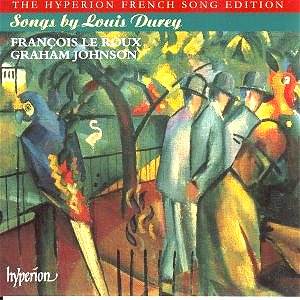What to expect from Durey as represented here? These
songs were written in the twenty-four months straddling the end of the
Great War. They are a little like Poulenc in companionable but sometimes
morose and enigmatic moods.
Durey was one of the least known of Les Six (the
title coined by Henri Collet in January 1920), the group of French composers
drawn together around Jean Cocteau. Parisian-born, Durey distanced himself
from the smart-chic, de haut en bas side of the artistic life
of the capital. He was much associated with the Fédération
Musicale Populaire which Graham Johnson, in his typically depth-detailed
notes, compares with Alan Bush's immersion in the Workers' Music Association.
Durey was a Communist and this too did not help his cause. Similarly
debilitating was the rift caused when Durey refused to collaborate with
the remaining five (and others) in the balletic Les Mariées
de la Tour Eiffel in 1921. Cocteau who was the 'mover and shaker'
here took strongly against Durey.
Hommage a Erik Satie differs strongly from the
style of the other seven cycles or sets on this tightly packed disc.
The Hommage sets in gawkily Satiesque music, words by Blaise
Cendrars - words which are as ridicule as those set by Walton
in his Façade. I knew the Basque Songs from Le
Roux's mixed recital with string quartet on Gallo (also reviewed here)
where they seemed even more carefree. These folk-styled songs were written
during a Summer stay with Cocteau at his home in the Pyrenean foothills.
They are not without Finzian echoes. The jewelled thirty songs of Apollinaire's
Le Bestiaire sequence (written without knowledge of his friend
Poulenc's settings from the same sequence) are all extremely brief,
limpid, melodious settings. Memorable in this companionable collection
are Le Chat whose words in translation are worth quoting:-
I want to have in my house
A sensible woman
A cat moving among the books
Friends in every season
Without which I can't live
This contentment plays like sun rays through this cycle.
Orphée is spoken in both versions (tracks 22 and 28).
Images was considered by the composer to be a true cycle and
one in which he achieved the most juste equipoise between words
and music. This he does in both lyricism and stern figuration. There
is a poignant ache in the plight of Crusoe and Friday rescued and brought
into an urban life which represents a brutalising fate. I was put in
mind of the tragic closing scenes of the film 'Walkabout' where the
Jenny Agutter character is restored to civilisation and yet yearns irremediably
for her fearful idyll in the wilds.
This is the fourteenth CD in Hyperion's French Song
Edition. I have listed the others at the foot of this review.
There are fifty-two songs on this CD; many extremely
short. There are two lengthy cycles/sets each lasting twenty five minutes
give or take a few minutes: La Bestiaire and Images à
Crusoé. They inhabit a world of insouciance, innocent contentment,
elysian pagan sunlight, playful delight and nostalgia.
Graham Johnson's notes and the translations of Durey's
'Catalogue Commenté' (1962) have been shamelessly poached in
preparing this review. The next issue of Grove or MGG need look no further
than Mr Johnson for authoritative entries.
Rob Barnett
HYPERION FRENCH SONG EDITION (the story so far
.... - September 2002)
La Procession - Eighty Years of French Song CDA66248
Bizet CDA66976
Lili Boulanger CDA66726
Complete Songs - Chabrier CDA67331/2
Complete Songs - Chausson CDA67321/2
Complete Songs - Duparc CDA66323
Fauré CDA66320
Gounod CDA66801/2
Hahn CDA67141/2
Koechlin CDA66243
Poulenc CDA66856
Déodat de Séverac CDA66983


